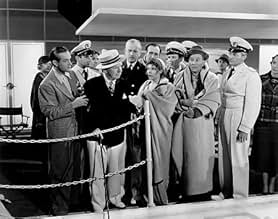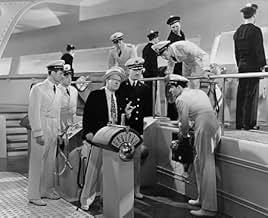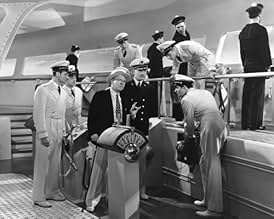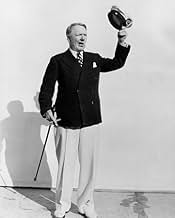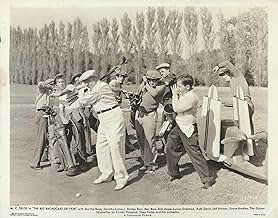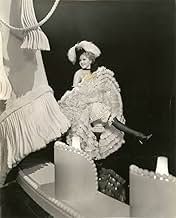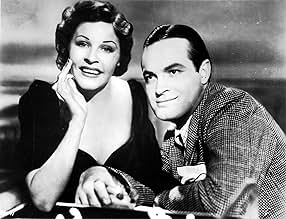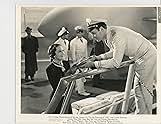CALIFICACIÓN DE IMDb
6.1/10
1.1 k
TU CALIFICACIÓN
Mr. Bellows causa confusión cómica en una competencia entre transatlánticos, en medio de romances y actos musicales.Mr. Bellows causa confusión cómica en una competencia entre transatlánticos, en medio de romances y actos musicales.Mr. Bellows causa confusión cómica en una competencia entre transatlánticos, en medio de romances y actos musicales.
- Dirección
- Guionistas
- Elenco
- Ganó 1 premio Óscar
- 5 premios ganados en total
Leif Erickson
- Bob Hayes
- (as Leif Erikson)
Virginia Vale
- Joan Fielding
- (as Dorothy Howe)
Opiniones destacadas
THE BIG BROADCAST OF 1938 (Paramount, 1938), directed by Mitchell Leisen, is another one of those "plotless" musicals produced by Paramount in the 1930s, this being the most memorable mainly because it puts two comic legends on screen for the first and only time: W.C. Fields (in his final film for the studio) and Bob Hope as Buzz Fielding (in his feature film debut). Out with the old, in with the new. Yet Fields and Hope share no scenes together, with Hope getting more screen time than Fields (in a dual role playing twin brothers).
The radio broadcast, hosted by Hope himself, is set on an ocean liner during a transatlantic race with another. Memorable moments include W.C. Fields golf game routine, and Shirley Ross as one of Hope's ex-wives sharing her "Thanks for the Memory" with him. "Memory" would become Hope's theme song for the duration of his career, and the Academy Award winning tune of 1938. In spite of her name placed second in the cast, Martha Raye, as Fields' accident prone daughter, arrives late into the story, making the best of her "Oh, boys!" and hi-jinx antics, as well as her song number, "Mama, Oh, Mama." On the lighter side, Dorothy Lamour (who twice sings "You Took the Words Right Out of My Heart") is somewhat wasted with her limited footage as Hope's fiancé who may or may not become Mrs. Fielding No. 4.
Aside from Lynne Overman, Ben Blue, Grace Bradley and Leif Erickson participating in the storyline, the shipboard entertainment consists of special guest appearances from Shep Fields and his Rippling Rhythm Orchestra (singing "This Little Ripple Has Rhythm"); Tito Guizar (singing "Zumi-Zumi" and "Don't Tell a Secret to a Rose") and Kirsten Flagstad (performing Richard Wagner's "Brunnilde's Battle Cry"). With the exception of "Thanks for the Memory," the score by Leo Robin and Ralph Rainger is forgettable. The big broadcast finale, "The Waltz Lives On" (sung by Hope and Ross) is passable, with Raye stepping into this number briefly with her hot jive "Truckin'". It's also interesting during that same number to see Hope dancing with Ross.
The final "Big Broadcast" musical consists of so much talent with little screen time, possibly victims of severe film editing. The theatrical trailer does include of Kirsten Flagstad performing in another opera segment not included in the final print. Although THE BIG BROADCAST OF 1938 can be a disappointment with too little Fields and too many song numbers unrelated to the plot, it somehow gets by.
The musical-comedy did have frequent revivals on the American Movie Classics cable channel from 1995 to 1998. The license to air this was later picked up by Turner Classic Movies where it premiered June 18, 2001, as part of its "Star of the Month" tribute, W.C. Fields. Prior to the start of the movie, host Robert Osborne talked a bit about the this Big Broadcast installment, and the annual musicals that preceded it, starting with the one that launched Bing Crosby in 1932, and the second in the series THE BIG BROADCAST OF 1936. Yet, there was no mention at all about the third, THE BIG BROADCAST OF 1937, as if it never existed, jumping immediately to 1938. While the three "Big Broadcast" musicals are close to being forgotten today, the 1938 edition happens to be the only one of the four available on video cassette and later on DVD, as part of the double feature package with 1938's COLLEGE SWING, also featuring Martha Raye and the legendary Bob Hope. Thanks for the Memories.(***)
The radio broadcast, hosted by Hope himself, is set on an ocean liner during a transatlantic race with another. Memorable moments include W.C. Fields golf game routine, and Shirley Ross as one of Hope's ex-wives sharing her "Thanks for the Memory" with him. "Memory" would become Hope's theme song for the duration of his career, and the Academy Award winning tune of 1938. In spite of her name placed second in the cast, Martha Raye, as Fields' accident prone daughter, arrives late into the story, making the best of her "Oh, boys!" and hi-jinx antics, as well as her song number, "Mama, Oh, Mama." On the lighter side, Dorothy Lamour (who twice sings "You Took the Words Right Out of My Heart") is somewhat wasted with her limited footage as Hope's fiancé who may or may not become Mrs. Fielding No. 4.
Aside from Lynne Overman, Ben Blue, Grace Bradley and Leif Erickson participating in the storyline, the shipboard entertainment consists of special guest appearances from Shep Fields and his Rippling Rhythm Orchestra (singing "This Little Ripple Has Rhythm"); Tito Guizar (singing "Zumi-Zumi" and "Don't Tell a Secret to a Rose") and Kirsten Flagstad (performing Richard Wagner's "Brunnilde's Battle Cry"). With the exception of "Thanks for the Memory," the score by Leo Robin and Ralph Rainger is forgettable. The big broadcast finale, "The Waltz Lives On" (sung by Hope and Ross) is passable, with Raye stepping into this number briefly with her hot jive "Truckin'". It's also interesting during that same number to see Hope dancing with Ross.
The final "Big Broadcast" musical consists of so much talent with little screen time, possibly victims of severe film editing. The theatrical trailer does include of Kirsten Flagstad performing in another opera segment not included in the final print. Although THE BIG BROADCAST OF 1938 can be a disappointment with too little Fields and too many song numbers unrelated to the plot, it somehow gets by.
The musical-comedy did have frequent revivals on the American Movie Classics cable channel from 1995 to 1998. The license to air this was later picked up by Turner Classic Movies where it premiered June 18, 2001, as part of its "Star of the Month" tribute, W.C. Fields. Prior to the start of the movie, host Robert Osborne talked a bit about the this Big Broadcast installment, and the annual musicals that preceded it, starting with the one that launched Bing Crosby in 1932, and the second in the series THE BIG BROADCAST OF 1936. Yet, there was no mention at all about the third, THE BIG BROADCAST OF 1937, as if it never existed, jumping immediately to 1938. While the three "Big Broadcast" musicals are close to being forgotten today, the 1938 edition happens to be the only one of the four available on video cassette and later on DVD, as part of the double feature package with 1938's COLLEGE SWING, also featuring Martha Raye and the legendary Bob Hope. Thanks for the Memories.(***)
One must have at least a passing familiarity with the 1930s to understand and/or enjoy "The Big Broadcast of 1938". Without that, the movie is a curio piece to be remembered only as Bob Hope's first major film appearance and the one where he first sang "Thanks for the Memory" (soon to be his theme); W.C. Fields's last film for Paramount; and, perhaps if you're of a certain age, Martha Raye and Dorothy Lamour.
"The Big Broadcast of . . . " series of films were strictly pastiche: an odd mixture of familiar film faces, radio personalities, and vaudeville, burlesque and novelty acts with an extremely loose storyline stringing it all together. For 10¢ and the B-picture with an A-picture double-bill, the movie would have hit the spot for most Depression-era movie-goers.
The humour and jokes are pretty period specific, making the movies already out-of-date even ten years later. Without a map and a compass, the territory would be unfamiliar to audiences 70 years later. But that's not unique to "The Big Broadcast of . . . " series either. How well will "Canonball Run", "Airplane", "Scary Movie" and "Meet the Spartans" (all products of their time) hold up in 70 years? As others have stated, the best segment of the film is Hope and Shirley Ross singing the very tender and bittersweet, "Thanks for the Memory". Don't expect much from "The Big Broadcast of 1938", view it as the mind-candy of your great-, grand- or parents' generation.
"The Big Broadcast of . . . " series of films were strictly pastiche: an odd mixture of familiar film faces, radio personalities, and vaudeville, burlesque and novelty acts with an extremely loose storyline stringing it all together. For 10¢ and the B-picture with an A-picture double-bill, the movie would have hit the spot for most Depression-era movie-goers.
The humour and jokes are pretty period specific, making the movies already out-of-date even ten years later. Without a map and a compass, the territory would be unfamiliar to audiences 70 years later. But that's not unique to "The Big Broadcast of . . . " series either. How well will "Canonball Run", "Airplane", "Scary Movie" and "Meet the Spartans" (all products of their time) hold up in 70 years? As others have stated, the best segment of the film is Hope and Shirley Ross singing the very tender and bittersweet, "Thanks for the Memory". Don't expect much from "The Big Broadcast of 1938", view it as the mind-candy of your great-, grand- or parents' generation.
There are momentary gems in this movie, and I recently bought the DVD because I fondly remembered it from its television broadcasts during my childhood. Hope and Ross's "Thanks for the Memory" (that's the actual spelling; it isn't plural) is so well portrayed that it seems they are recalling actual moments from their lives. This is almost the only moment of sincerity in this otherwise farcical fluff-piece. Martha Raye's "Oh, Mama!" is eye-popping primarily because I believe she did her own stunts in it, and she is bandied about like an unlucky mouse caught by a gruesomely playful puss. WC Fields sparks frequent smirks with his ostentatious manner combined with total buffoonery. Dorothy Lamour is only pleasant; I don't believe she had yet found her spark for comedy that was later displayed in the Hope & Crosby Road Movies. Her song (she only gets one but sings it ad infinitum to Leif Erickson), along with the remainder of the musical score, is surprisingly engaging. All in all an enjoyable musical comedy review, designed so audiences could finally see the faces of the performers they invited into their living rooms through the radio.
Lots of mainly young and beautiful stars of the thirties appear in this movie. Dorothy Lamour and Shirley Ross are knockouts with the zany Martha Raye as a comic foil. This is a great movie for black and white buffs.
Some classic scenes in this movie:
W. C. Fields in his best golf playing scenes ever.
Martha Raye hugging and puffing with her big mouth against a sail to keep a life raft sailing toward a big ocean liner.
Kirsten Flagstad from the Metropolitan opera delivering a Wagner aria.
But the piece de resistance is Shirley and Bob singing what would later become Bob Hope's Theme song, "Thanks for the Memory."
Although not listed in the cast, I saw Lucille Ball, probably with the most lines of any of her thirties' movies.
Some classic scenes in this movie:
W. C. Fields in his best golf playing scenes ever.
Martha Raye hugging and puffing with her big mouth against a sail to keep a life raft sailing toward a big ocean liner.
Kirsten Flagstad from the Metropolitan opera delivering a Wagner aria.
But the piece de resistance is Shirley and Bob singing what would later become Bob Hope's Theme song, "Thanks for the Memory."
Although not listed in the cast, I saw Lucille Ball, probably with the most lines of any of her thirties' movies.
The "plot" of this slapdash musical concerns a transatlantic ship race between two new "super-ships", the Gigantic and the Colossal. On board the former, S.B. Bellows (W.C. Fields), the brother of shipping line boss T. Frothingill Bellows (also Fields), tries to ensure that his ship wins, although he spends most of his times in drunken calamities. Also on board is entertainment host Buzz Fielding (Bob Hope), who takes time in between introducing musical acts to rekindle romance with one of his ex-wives (Shirley Ross), while his current girlfriend (Dorothy Lamour) falls for handsome ship radioman Bob (Leif Erickson). Things get even more chaotic when Bellows' daughter Martha (Martha Raye) comes aboard. Also featuring Ben Blue, Grace Bradley, Lynne Overman, Patricia Wilder, Rufe Davis, Lionel Pape, Virginia Hale, James Craig, Richard Denning, Monte Blue, Mae Busch, Leonid Kinskey, Bernard Punsly, and Russell Hicks.
Seemingly assembled from bits of different movies awkwardly stitched together, there's some funny stuff here, but no kind of pacing or interesting narrative. Fields, who was making his final Paramount film here, is funny, and his golf game and billiards game scenes are top notch. Bob Hope, making his feature debut, sings his signature song. I was pleasantly surprised to see future Road co-star Lamour already working with him. Martha Raye gets a rather impressive song and dance number that gets acrobatic and she obviously didn't use a double. The music numbers are an odd lot, too, with a couple of songs by Mexican star Tito Guizar, a performance from Norwegian opera diva Kirsten Flagstad (doing Wagner's "Brunnhilde's Battle Cry"), and Shep Fields and His Rippling Rhythm Orchestra doing "This Little Ripple Had Rhythm" which combines live action with animation to show the "origin" of the "rippling rhythm", which apparently was an ambulatory blob of swamp water that separates from a bog and walks to Fields' band and teaches them. It makes as much sense as it sounds. The movie won the Oscar for Best Song ("Thanks for the Memory").
Seemingly assembled from bits of different movies awkwardly stitched together, there's some funny stuff here, but no kind of pacing or interesting narrative. Fields, who was making his final Paramount film here, is funny, and his golf game and billiards game scenes are top notch. Bob Hope, making his feature debut, sings his signature song. I was pleasantly surprised to see future Road co-star Lamour already working with him. Martha Raye gets a rather impressive song and dance number that gets acrobatic and she obviously didn't use a double. The music numbers are an odd lot, too, with a couple of songs by Mexican star Tito Guizar, a performance from Norwegian opera diva Kirsten Flagstad (doing Wagner's "Brunnhilde's Battle Cry"), and Shep Fields and His Rippling Rhythm Orchestra doing "This Little Ripple Had Rhythm" which combines live action with animation to show the "origin" of the "rippling rhythm", which apparently was an ambulatory blob of swamp water that separates from a bog and walks to Fields' band and teaches them. It makes as much sense as it sounds. The movie won the Oscar for Best Song ("Thanks for the Memory").
¿Sabías que…?
- ErroresNear the end of the movie the helmsman said that the S.S. Gigantic was diesel powered. That would mean that the liner's proper name would be MV (Motor Vessel) Gigantic as opposed to SS (Stream Ship) Gigantic.
- Citas
First reporter: Say, do you know anything about electricity?
S.B. Bellows: My father occupied the chair of applied electricity at State Prison.
- ConexionesFeatured in Hollywood and the Stars: The Fabulous Musicals (1963)
- Bandas sonorasThis Little Ripple Had Rhythm
(uncredited)
Music by Ralph Rainger
Performed by Shep Fields and His Rippling Rhythm Orchestra
Selecciones populares
Inicia sesión para calificar y agrega a la lista de videos para obtener recomendaciones personalizadas
- How long is The Big Broadcast of 1938?Con tecnología de Alexa
Detalles
- Fecha de lanzamiento
- País de origen
- Idioma
- También se conoce como
- Radioparaden 1938
- Locaciones de filmación
- Eastern Service Studios, Astoria, Queens, Nueva York, Nueva York, Estados Unidos(sequence: Kirsten Flagstad aria)
- Productora
- Ver más créditos de la compañía en IMDbPro
- Tiempo de ejecución1 hora 31 minutos
- Color
- Relación de aspecto
- 1.37 : 1
Contribuir a esta página
Sugiere una edición o agrega el contenido que falta

Principales brechas de datos
By what name was The Big Broadcast of 1938 (1938) officially released in India in English?
Responda
